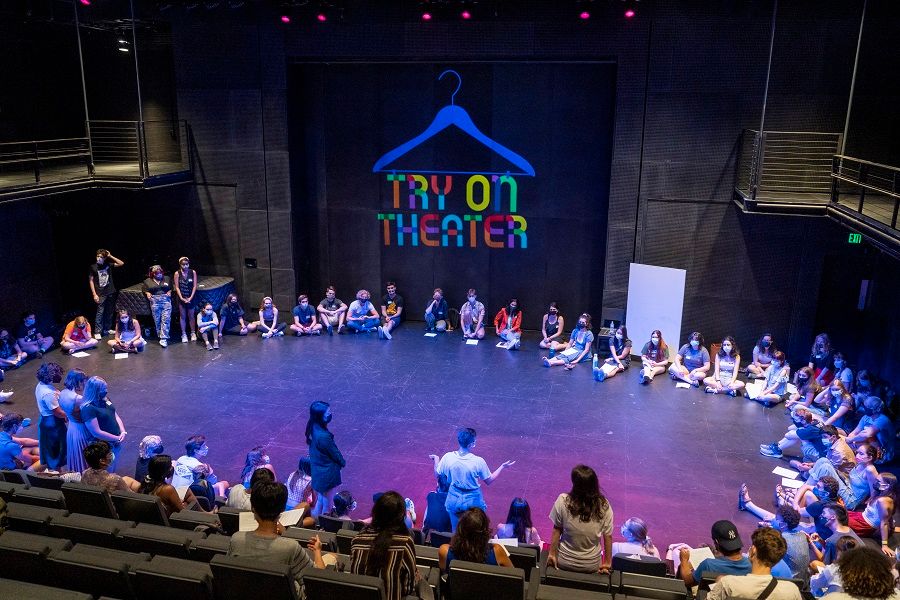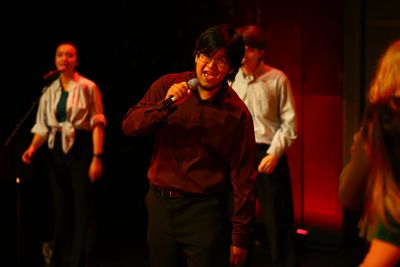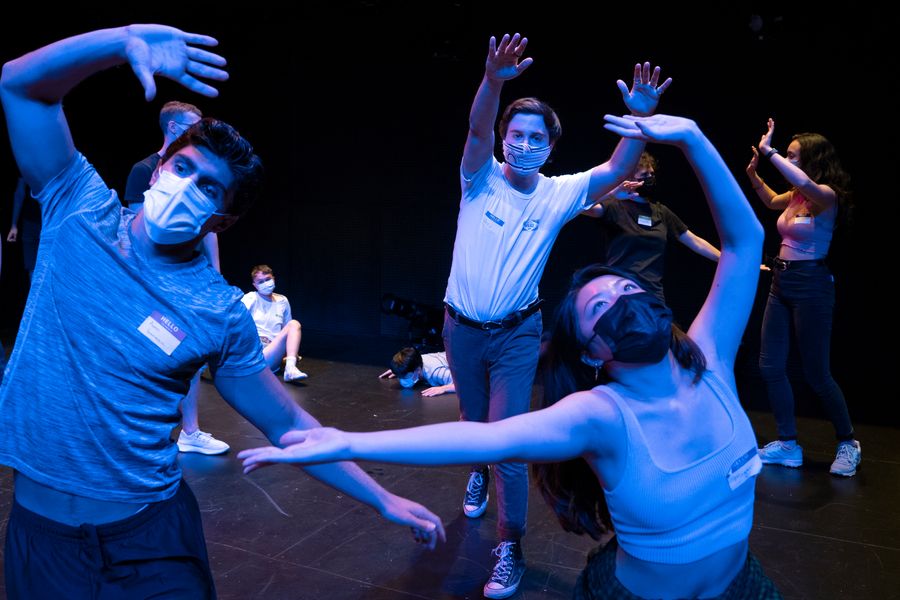Elena Araoz wears many hats: She is a director, actor, and lecturer in theatre at Princeton University’s Lewis Center for the Arts. As such, she sees the audition room from a variety of perspectives. As an actor, for instance, she is conditioned to show her best self to the production staff. As a director, she is trained to make judgements about each actor entering the room in hopes of casting the best possible person for each role. And as a lecturer at Princeton University, she is intent on ensuring that every student she encounters has the tools needed to succeed in theatre post-graduation.
But this past year, she and the administration at the Lewis Center for the Arts were challenged with a new way to prepare students. Princeton University has thrown away the practice of traditional auditions and have introduce “Try On Theater Days,” replacing high-intensity auditions with educational workshops as a means to cast performers and stagehands for the school’s seasonal productions.
Unlike many college programs, the Lewis Center for the Arts does not operate as a conservatory. The theatre program offers students certificates, and students propose theatrical projects in their junior year that they intend to write, compose, direct, music-direct, perform, design, or stage-manage under the guidance of visiting artists and their professional faculty. Additionally, the administration commissions outside work that is faculty-driven and faculty-directed.
What has been different since the fall of 2021 is that, rather than holding traditional auditions to screen applicants, Try On Theater entails student project leaders and professional faculty members coming together to design workshops that allow students to show their skill sets to better place them in roles both in front of and behind the curtain. The first day of the three-day process is a community day, at which all Princeton students are invited to meet the theatre department and to experience introductory-level singing, dancing, and acting workshops to get a sense what it means to perform in a public space. The next two days are designated for students to “try on” specific shows in the upcoming season, with workshops designed to introduce students to the each production’s premise. Students meet the project leaders, discuss content warnings, have the opportunity to question each show’s topics and themes, and then get to “try on” different roles, not only in the acting sense but also, for example, stage management, in which prospective students get the opportunity to try calling cues. The purpose is to introduce and teach students to different facets of theatre rather than make judgments about what capabilities certain students walk in the door with, and in turn let students decide if theatre is something they want to pursue.
This new process aims to level the playing field for students who didn’t have traditional theatrical training prior to attending Princeton University. The goal is to transform the student theatre culture and attract a more diverse population, as well as to reduce the cliques and the student hierarchies that often result when theatre students consistently casting their friends in productions. Try On Theater Day, a solution for students who felt like they had missed out on performing opportunities during their college experience, has already seen a large increase in student participation, according to organizers.

The idea grew out of a student teach-in day two summers ago. After the racial reckoning of 2020, several theatres were forced to reevaluate their equity, diversity, and inclusion practices; educational institutions like Princeton followed suit. The administration paid students to teach a six-part series in which they described challenges they had faced throughout their college experience in the theatre department. Professors were tasked with homework and readings, and were asked to evaluate the biased practices inherent in their arts organization. In the teach-in, several students who lacked traditional theatre training prior to attending Princeton said they found it more difficult to participate in onstage productions; for example, a student who didn’t have sight reading skills found it difficult to excel in same-day callbacks when asked to sing from sheet music. And students of specific ethnic backgrounds said they were less likely to be cast in shows, leaving student directors to pick from their own networks and cliques. Likewise, microaggressions ran rampant throughout audition season, discouraging certain students from participating or even returning for the next season.
Jane Cox, who serves as the director of the program in theatre at Lewis Center of the Arts, expressed how eye-opening and transformative the student teach-in experience was for her, saying that it forced her to reexamine the way students were being included and excluded from the theatre community on campus.
“How do we make sure that opportunities are being shared among the students in as equal and inclusive ways as possible?” Cox wondered. “It was clear from the soft data we had that it wasn’t happening prior to 2020. So a piece of this was figuring out, how are we making decisions once we have folks in the room who want to be in shows, and we’re asking them to weigh in on which projects they’d like to be involved in and taking that as seriously as we take the opinions of the project leaders? How do we also make sure we’re not, like, opportunity hoarding?” These were the kinds of questions that drove Jane and the faculty to consider this approach to expanding the student body community.

One student who found Try On Theater Days exactly what he had been looking for was John Venegas Juarez. Prior to attending Princeton, Venegas Juarez knew he had an affinity for the performing arts, but didn’t think there was a space for him at the Lewis Center of the Arts. For one, he didn’t have professional training, as did many fellow students, who had gone to prestigious performing arts high schools. But then, as a result of Try On Theater Days, he nabbed the leading role of Javi Flores in Princeton’s production of Late Bloomer, a musical that mirrored Juarez’s home life and Latinx upbringing. And he found himself doing more than just acting the lead, but also getting to chance to integrate parts of his culture into the production.
“There’s a scene where they get the coffee brewing, and I was like, ‘That’s not what they do in my Mexican household,'” Juarez recalled, pointing out that his family was more likely to stir powdered Nescafe instant coffee into already boiling water. “Next thing you know, that’s in the show! Small things like that makes casting actors that had those experiences make it more authentic.” Try On Theater Days, Juarez said, have made him realize that a career in theatre may be attainable for him. He’s even found himself expressing more creative sides of himself in his academic school work, he said.
The biggest takeaway from Try On Theater days has been a shift in power dynamics. Anyone who has been in an audition room can testify to the high-stakes pressure one feels before entering a room and performing for a panel of judges behind a table. And no amount of preparation, affirmations, or anxiety-reducing tactics can ever ease the tension. It’s the name of the theatre game—but maybe the game itself is faulty? As Araoz put it, “When you go into an audition room as an actor, they’ll usually ask you questions about yourself. I can’t tell you how many times I’ve wanted to say, ‘No, why don’t you tell me a little bit about yourself.’” The idea of turning the tables around lets actors and other prospective theatre workers know they don’t have to be at the mercy of people sitting behind a casting table.
In much the same way the faculty was being challenged to reconsider how they teach, Araoz said, student leaders were being challenged to rethink the way they cast and run their projects. For example, Try On Theater Days eliminated stand-alone singing in callbacks, instead relying on group singing to identify vocal talent. Araoz, along with the administration, pushed students and faculty advisors to evaluate prospective singers using different methods than they were used to. “I said, ‘Well, maybe actually you have to train your ear to hear voices in a group,’” Araoz said.
This new form of teaching not only prepares students to find a place in the theatre but to become stronger leaders overall. Students are charged with incorporating equity from the start of their creative process. Everyone runs the race, but not everyone begins in the same place. Try On Theater Days encourages students to view the world from a lens different from their own, and encourages them to understand that not everyone has had access to the same resources and experiences. And though this process may be unfamiliar to many, Cox said that one of the biggest goals of the Lewis Center of the Arts is not to “teach to the present of American theatre; we’re hoping to teach to the future of it.”
Princeton’s next Try On Theater Days will be September 6-8.
Rachelle Legrand (she/her) is an editorial contributor to American Theatre.


